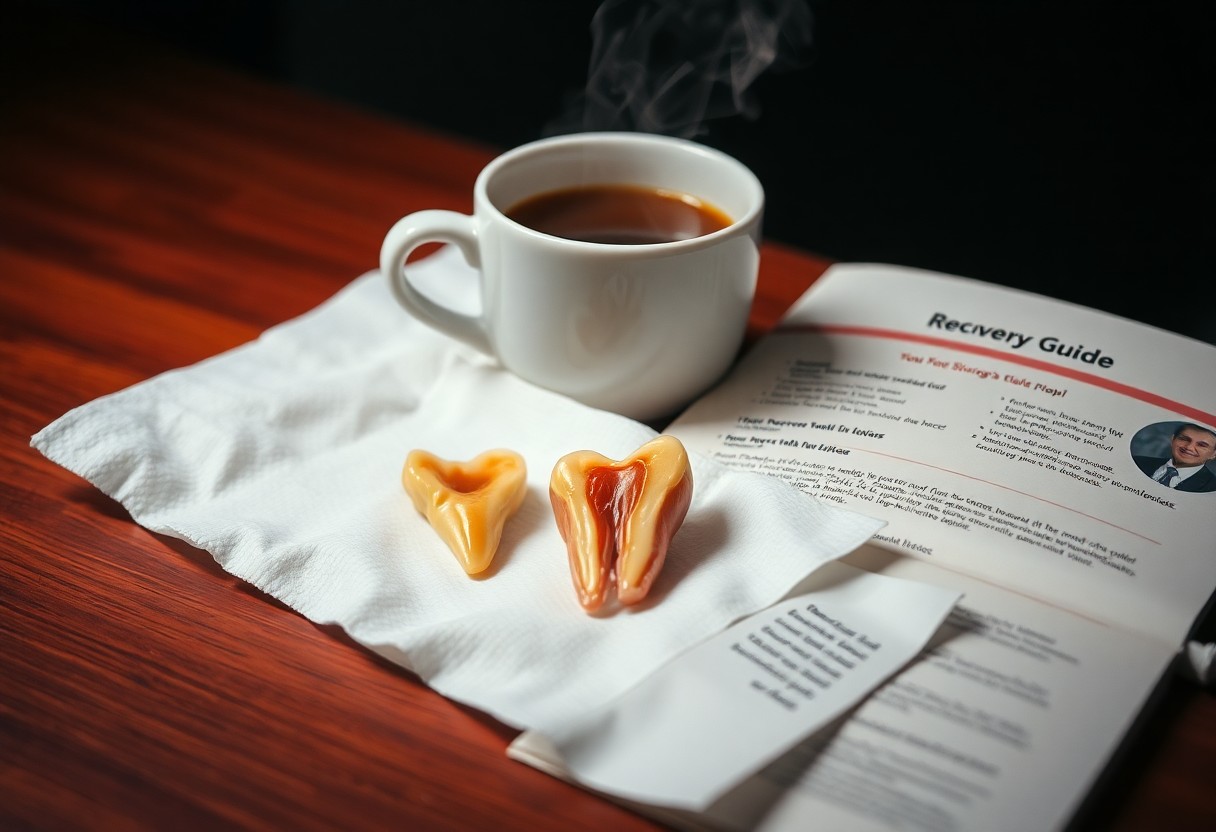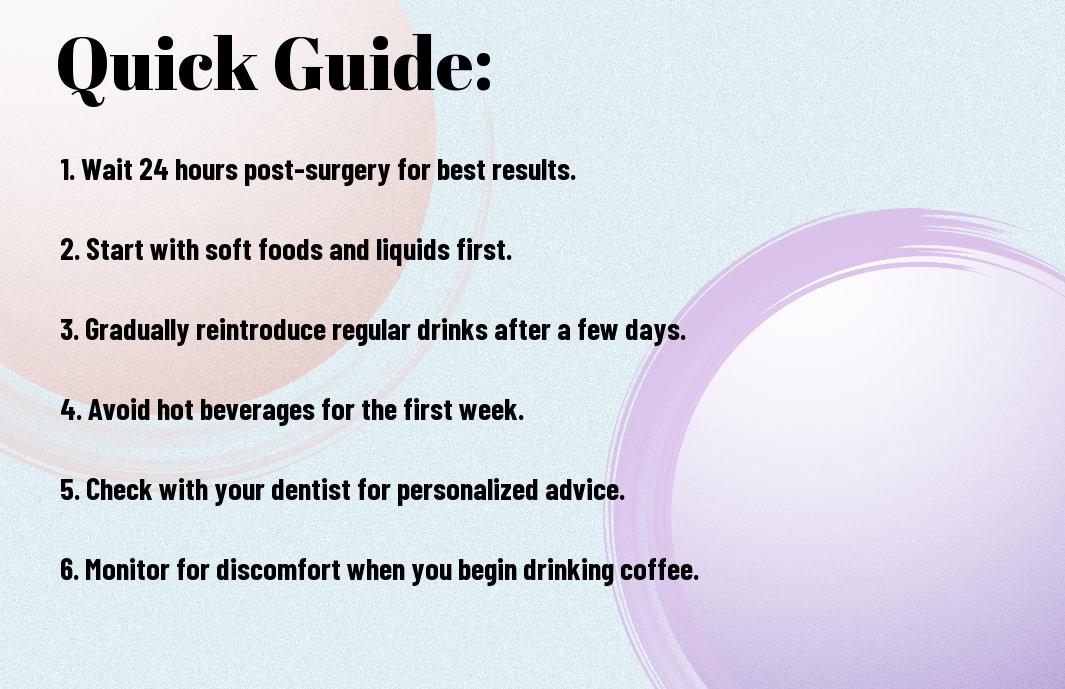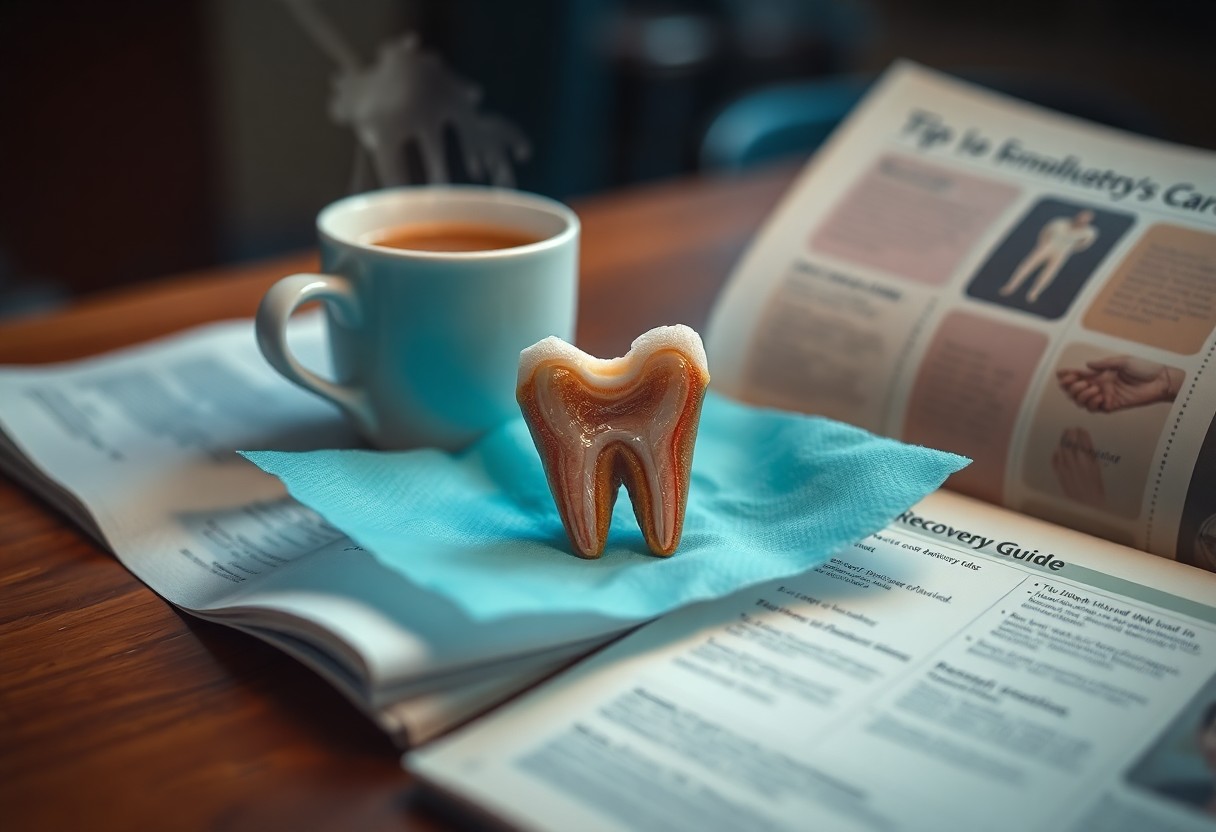Many people look forward to enjoying their favorite beverages again after wisdom teeth removal, but timing is necessary to ensure a smooth recovery. It’s important to understand when you can safely indulge in coffee, as too soon can lead to complications like dry socket or increased swelling. This guide will provide you with valuable insights on when it’s appropriate to caffeinate after your procedure, so you can support your healing process while enjoying your beloved brew.

Key Takeaways:
- Timing: It is generally advised to wait at least 24 hours post-surgery before consuming coffee to help reduce the risk of complications.
- Temperature: After the initial recovery period, if you choose to drink coffee, ensure it is at a cool or lukewarm temperature to avoid irritating the surgery site.
- Caffeine Impact: Be mindful of your caffeine intake, as excessive consumption can interfere with healing and hydration levels.

Understanding Wisdom Teeth Removal
The removal of wisdom teeth is a common dental procedure. As they typically emerge in late adolescence or early adulthood, many individuals find themselves needing this treatment to prevent future oral health issues.
What Are Wisdom Teeth?
Wisdom teeth, or third molars, are the last set of molars that generally appear in your mouth between the ages of 17 and 25. Due to their late eruption, they can become problematic if there’s insufficient space in your jaw for them to align properly.
Reasons for Extraction
Little do many realize that wisdom teeth can create a variety of issues, necessitating their extraction. If they are impacted, which means they cannot fully emerge from the gum line, they can lead to pain, infection, or damage to adjacent teeth.
A common reason for extraction is impaction. Impacted wisdom teeth can cause a range of problems, including crowding of your other teeth, infection, and even cyst formation around the tooth. In some cases, these teeth may grow at an angle toward other molars, leading to more severe complications. Therefore, many dentists recommend removing them proactively to avoid these issues.
The Surgical Procedure
Now, let’s talk about the surgical procedure for wisdom teeth removal. The process usually involves sedation and the careful extraction of the teeth from your jawbone.
This procedure is typically performed under local anesthesia, sedation, or general anesthesia, depending on your needs and the complexity of the extraction. Your oral surgeon will make incisions in the gum tissue to access the tooth and, if necessary, remove some bone to extract the tooth. Afterward, they will stitch the gums to promote healing. Following the surgery, you might experience swelling and discomfort, so following your dentist’s post-operative care instructions is crucial for a smooth recovery.
Recovery Timeline
There’s a lot to consider when it comes to your recovery after wisdom teeth removal, and understanding the timeline can greatly help you manage your expectations and care. Each phase of recovery has its own requirements, especially regarding what you can consume, including coffee.
Immediate Post-Operative Phase
PostOperative care is vital right after your surgery. For the first 24 hours, you need to focus on resting and avoiding any activities that could interfere with the healing process. It’s important to keep your head elevated while resting and apply ice packs to minimize swelling. You should avoid hot beverages, including coffee, during this period.
Week One Recovery
PostOperative recovery during the first week is all about healing and following your dentist’s instructions. You will likely experience some discomfort and swelling, which can make it challenging to eat and drink anything, including coffee. Stick to a soft-food diet and hydrate with cool liquids.
Understanding the timeline of your recovery involves knowing that during this first week, you should be cautious with what you consume. Most dental professionals recommend waiting at least three to five days before even considering drinking coffee again. Your body needs to stabilize, so prioritize hydration with cool or lukewarm drinks, while avoiding anything that could lead to irritation.
Long-Term Healing
There’s a significant focus on your overall recovery after the first week. The healing process continues, and it’s necessary to follow up with your dentist to ensure everything is progressing as expected. Your body will need time to fully recuperate from the surgery.
Plus, it’s important to be aware that full recovery can take several weeks. While you might feel better after a week, your jaw and gums will still be sensitive. Reintroducing coffee too soon could lead to complications, such as increased discomfort or even issues like dry sockets. Gradually reintroduce beverages like coffee into your diet once you feel ready, ideally after consulting with your dentist for personalized advice.
Factors Affecting Coffee Consumption
Once again, contemplating when to indulge in coffee post-wisdom teeth removal is not a straightforward choice. Several factors influence your ability to enjoy a cup without jeopardizing your recovery:
- Type of Anesthesia Used
- Individual Pain Tolerance
- Presence of Complications
Knowing these factors will guide you in making an informed decision about your coffee consumption. For more insights, check out Is It Safe to Drink Coffee After a Tooth Extraction?.
Type of Anesthesia Used
One important consideration is the type of anesthesia used during your procedure. If you received sedation, it’s advisable to wait until the effects have worn off completely before consuming caffeine. Sedation can affect your perception and reactions, making it unwise to drink coffee until you feel back to normal.
Individual Pain Tolerance
Any individual pain tolerance also plays a significant role in your recovery journey. Some people may experience discomfort that makes coffee consumption unappealing, while others might feel ready for it sooner. Listen to your body and assess whether the sensation in your mouth allows for comfortable coffee enjoyment.
Plus, your pain threshold can affect your mood and overall behavior. Caffeine can amplify feelings of discomfort due to its stimulating nature, so consider whether it’s worth the risk of heightened sensitivity. Ensuring your comfort can lead to a smoother recovery experience.
Presence of Complications
Consumption complications can arise during the healing process, impacting your ability to enjoy coffee. Issues like dry socket, swelling, or infections can make it difficult to consume anything, including your favorite brew. Pay attention to how your mouth feels and consult with your dentist if you notice concerning symptoms.
With any complications present, it’s vital to prioritize your health over your cravings. Engaging in coffee consumption with these issues can cause further irritation and delay your healing. Always err on the side of caution and reach out for professional advice should complications occur.
Types of Coffee to Consider
Many factors influence your decision on what type of coffee to drink after your wisdom teeth removal. While it may be tempting to probe your favorite brew, understanding the different options can help in your recovery journey. Below is a comparison of coffee types that might be suitable:
| Type of Coffee | Notes |
| Decaffeinated Coffee | Lower acidity and less stimulating effects. |
| Cold Brew | Generally smoother and less acidic than hot coffee. |
| Hot Coffee | Can be acidic, which might irritate your sensitive gums. |
| Non-Dairy Alternatives | May be easier on your stomach and gums than dairy. |
| Herbal Infusions | Caffeine-free and can be soothing. |
The type of coffee you choose is paramount for your recovery.
Decaffeinated Coffee
There’s an advantage in choosing decaffeinated coffee after your procedure. It provides a comforting warm beverage without the stimulating effects of caffeine that can lead to increased heart rate or anxiety. Additionally, decaf coffee is generally lower in acidity, which minimizes the risk of discomfort to your healing gums.
Cold Brew vs. Hot Coffee
Coffee lovers often ponder the choice between cold brew and hot coffee. Cold brew tends to be less acidic and smoother than its hot counterpart, making it a gentler option for your tender gums.
A significant benefit of cold brew is its lower acidity, which can help prevent discomfort during your healing process. On the other hand, hot coffee might irritate your sensitive mouth and cause unnecessary pain. If you must have hot coffee, consider diluting it with milk or water, but cold brew is generally the better choice.
Non-Dairy Alternatives
One approach that many find helpful post-surgery is opting for non-dairy alternatives in your coffee. These options can be a gentler alternative that reduces the risk of digestive upset and adds a creamy texture.
It’s necessary to evaluate your choices carefully. Almond milk, oat milk, or coconut milk are often favored because they are not only dairy-free but also provide a range of flavors that can complement your coffee. Just ensure any ingredient does not introduce additional sweetness that can aggravate inflammation or sensitivity.

Tips for Consuming Coffee Safely After Surgery
Now that your wisdom teeth removal is behind you, you’ll want to enjoy your favorite cup of coffee without compromising your recovery. Here are some tips to help you consume coffee safely:
- Allow adequate time for recovery before introducing strong beverages.
- Choose decaffeinated options initially to reduce acidity.
- Stay mindful of temperature, as hot beverages can irritate your healing gums.
- Consider making your coffee softer by adding milk or cream.
- Monitor your body’s response to coffee; if you notice discomfort, reconsider your intake.
Recognizing the importance of a gradual return to your coffee routine will aid your recovery.
Wait Time Recommendations
Consuming coffee right after your procedure may not be ideal. Most experts recommend waiting at least 24 to 48 hours before having your first cup. This allows your body to begin the healing process and minimizes the risk of complications.
Hydration and Caffeine
On the topic of hydration, it is vital to balance your fluid intake with your caffeine consumption. Although coffee can be hydrating, excessive caffeine can lead to dehydration, which might hinder your healing.
To ensure you remain adequately hydrated, strive to drink plenty of water alongside your coffee. You might also want to consider limiting your caffeine intake altogether during the first few days post-surgery to prevent any adverse effects on your recovery.
Incorporating Soft Foods
On your journey back to coffee enjoyment, it’s imperative to consider the foods you’ll be pairing it with. Incorporating soft foods into your diet will help protect your healing gums and support your overall recovery.
Incorporating soft foods in your diet allows you to enjoy your coffee without risking any damage to your surgical sites. Opt for things like yogurt, mashed potatoes, or oatmeal that can complement your coffee and provide a balanced, gentle meal during your recovery period.
Step-by-Step Guide to Reintroducing Coffee
All dental procedures come with their own set of guidelines for recovery. Coffee, a beloved beverage for many, requires a careful reintroduction post-wisdom teeth removal. Below is a structured approach to help you smoothly transition back to your coffee routine.
| Timeframe | Guidelines |
|---|---|
| First 24 Hours | Avoid caffeine entirely to minimize swelling and prevent interference with healing. |
| Days 2-3 | Introduce coffee gradually; start with decaffeinated options to assess your tolerance. |
| Week One and Beyond | Carefully monitor your symptoms and only reintroduce regular coffee if you feel comfortable. |
First 24 Hours – Avoiding Caffeine
Coffee should be avoided in the first 24 hours following your wisdom teeth removal. This is important because caffeine can lead to increased bleeding and inflammation, hindering your recovery process. Focus on staying hydrated with water or herbal teas to keep your body nourished during this crucial time.
Days 2-3 – Gradual Introduction
Guide yourself through the reintroduction of coffee by starting with decaffeinated options. This allows your body to adjust after surgery without overwhelming your system. Observe how your body responds and only proceed if you feel comfortable.
Caffeine can enhance your energy, but during the initial days, it’s important to listen to your body. If you experience discomfort or notice any adverse symptoms, consider extending your caffeine break. Starting with small, mild doses of decaf will help you gauge your comfort level as you ease back into your coffee habit.
Week One and Beyond – Monitoring Symptoms
On entering the second week, you may feel ready to reintroduce regular coffee. However, you must be diligent in monitoring your symptoms. Pay attention to any discomfort, swelling, or signs of complications that may arise after having coffee.
To ensure a smooth recovery, always prioritize your oral health over your cravings. If you encounter increased pain or swelling after consuming regular caffeine, remove it from your diet immediately. Staying mindful during this time ensures that you can enjoy your favorite beverages while supporting healing.
Pros and Cons of Drinking Coffee Post-Surgery
For those considering whether to indulge in coffee after wisdom teeth removal, it’s important to weigh the benefits against potential drawbacks. Below is a breakdown of the pros and cons to help you make an informed decision.
| Pros | Cons |
|---|---|
| Can help with alertness and concentration | Might cause dehydration, which is not ideal post-surgery |
| May boost your mood and energy levels | Caffeine can lead to increased heart rate and anxiety |
| Can act as a pain reliever in some cases | May irritate your stomach, causing discomfort |
| Offers antioxidants that can support recovery | Hot coffee can aggravate swelling and discomfort |
| Can be a comforting ritual to help with emotional recovery | May interfere with prescribed pain medication |
Benefits of Caffeine
If you decide to drink coffee after your surgery, caffeine can offer several benefits. It may help improve your focus and mood, making the recovery period feel less tedious. The antioxidants found in coffee can also provide some support to your healing process, potentially reducing inflammation and promoting well-being.
Potential Risks and Side Effects
Some risks associated with drinking coffee post-surgery should not be overlooked. Excessive consumption can complicate your recovery and even lead to additional discomfort.
A few notable side effects include increased heart rate, which can be alarming during your recovery, and potential dehydration caused by the diuretic effect of caffeine. Additionally, if your coffee is too hot, it could exacerbate any swelling or sensitivity you’re experiencing after your procedure. Be cautious with your intake, especially if you’re taking pain medication, as caffeine may interfere with its effectiveness. Prioritizing your recovery should always come first, so listen to your body and consult with your healthcare provider if you’re unsure.
Final Words
Ultimately, you should avoid drinking coffee for at least 24 to 48 hours after your wisdom teeth removal to ensure proper healing. After this initial period, if you’re feeling up to it and have no complications, you can enjoy your coffee. However, it’s best to avoid extremely hot beverages, as they may irritate the surgical site. Always listen to your body and consult with your dentist or oral surgeon if you have any concerns about your recovery. Your health and comfort should be your top priority during this healing phase.
FAQ
Q: When is it safe to drink coffee after wisdom teeth removal?
A: It is generally advisable to wait at least 24 to 48 hours after your wisdom teeth extraction before consuming coffee. This gives your body time to begin the healing process and reduces the risk of complications such as bleeding or increased pain.
Q: Can drinking hot coffee affect my recovery?
A: Yes, drinking hot coffee can potentially affect your recovery. Hot beverages can cause swelling or discomfort in the extraction site. It’s best to wait until you are fully healed, typically one week after surgery, before returning to hot drinks.
Q: What should I do if I crave coffee during my recovery?
A: If you find yourself craving coffee during your recovery, consider opting for a cold brew or iced coffee after 48 hours, as it is less likely to irritate the surgical site. Avoid adding any ingredients that may be hard to chew, like ice or sweeteners, until you have fully recovered.
Q: Are there any alternatives to coffee I can drink after my procedure?
A: Yes, there are several alternatives to coffee you might consider during your recovery period. Herbal teas (cooled to a safe temperature), smoothies, and soft drinks are gentle on your healing gums and can still provide hydration and comfort without the negative effects of coffee.
Q: How does caffeine in coffee affect pain management after surgery?
A: Caffeine can sometimes exacerbate discomfort or interfere with pain management, especially when combined with certain medications. It’s wise to consult your dentist or oral surgeon about your caffeine intake during the recovery phase to avoid any potential issues.
Q: Can I add milk or cream to my coffee after surgery?
A: If you decide to have coffee after the initial recovery phase (about one week post-extraction), you may add milk or cream as long as your diet can tolerate these ingredients. However, avoid using any hard or crunchy additives that may irritate your gums.
Q: How can I ensure a smooth recovery while managing my coffee habits?
A: To ensure a smooth recovery while managing your coffee habits, start by avoiding any coffee for the first 48 hours. Gradually reintroduce it as your recovery progresses, monitoring your comfort levels with both temperature and acidity. Always listen to your body and consult your dentist if you have any concerns during your recovery.
